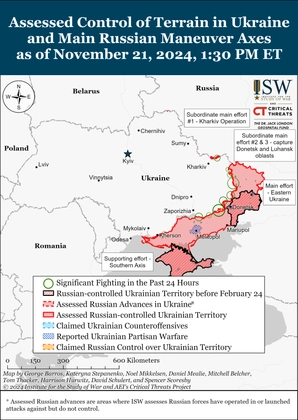Key Takeaways from the ISW:
- The Ukrainian incursion into Kursk Oblast and Russian offensive operations in eastern Ukraine are not in themselves decisive military operations that will win the war. Both Russian and Ukrainian forces lack the capability to conduct individual decisive war-winning operations and must instead conduct multiple successive operations with limited operational objectives that are far short of victory, but that in aggregate can achieve strategic objectives.
- It is too early to assess the outcomes and operational significance of the Ukrainian incursion into Russia and the ongoing Russian offensive effort in eastern Ukraine. The significance of these operations will not emerge in isolation, moreover, but they will matter in so far as they relate to a series of subsequent Russian and Ukrainian campaigns over time.
- Russian President Vladimir Putin and the Russian military command likely view maintaining the theater-wide initiative as a strategic imperative to win a war of attrition against Ukraine, and both the Ukrainian incursion in Kursk Oblast and the Russian offensive effort in eastern Ukraine will impact whether Russian forces can retain the initiative in the short-term.
- Ukrainian officials have indicated that Ukraine's operation in Kursk Oblast does not have long-term territorial objectives but instead aims to generate theater-wide operational and strategic pressures on Russian forces.
- The Ukrainian operation in Kursk Oblast has already generated theater-wide operational and strategic pressures on Russian forces, and subsequent phases of fighting within Russia will likely generate even greater pressures on Putin and the Russian military.
- Russian forces will not be able to retain the initiative throughout eastern Ukraine indefinitely, and the culmination of Russian offensive operations will present Ukrainian forces with opportunities to contest the initiative further.
- The Russian offensive operation to seize Pokrovsk is emblematic of the Russian approach to the war in Ukraine that embraces positional warfare for gradual creeping advances and seeks to win a war of attrition.
- Ukraine's incursion into Kursk Oblast illustrates how Ukrainian forces can use maneuver warfare to offset Russian manpower and materiel advantages.
- It is simply too early to draw dispositive conclusions about the lasting effects that the two very different Russian and Ukrainian efforts will have on the course of the war.
- ISW offers these observations about the Ukrainian incursion in Kursk Oblast and the months-long Russian offensive effort in eastern Ukraine to provide a balanced framework for assessing the significance of the current Russian and Ukrainian operations on the course of the entire war, which will remain uncertain for the foreseeable future.
- Russia and Ukraine were reportedly planning to meet in Qatar in August 2024 to discuss a possible moratorium on Ukrainian and Russian strikes on energy infrastructure, but Russia temporarily postponed the summit after the start of the Ukrainian operation in Kursk Oblast.
- Russia remains uninterested in any broader, meaningful negotiations regardless of Russia's willingness to entertain or agree to a possible moratorium on energy infrastructure strikes.
- Russia is almost certainly only considering a possible moratorium on energy strikes due to Ukraine's months-long strike campaign against Russian oil refineries — demonstrating a secondary effect of Ukraine's strike campaign.
- Ukrainian forces advanced within Chasiv Yar, and Russian forces recently marginally advanced near Kreminna, Pokrovsk, and Donetsk City.
- The Russian government continues efforts to use the "Time of Heroes" program to integrate trusted Russian military veterans into Russian government roles.
JOIN US ON TELEGRAM
Follow our coverage of the war on the @Kyivpost_official.
Authors: Riley Bailey, Christina Harward, Angelica Evans, Grace Mappes, Davit Gasparyan, and Frederick W. Kagan.
See the original here.
To suggest a correction or clarification, write to us here
You can also highlight the text and press Ctrl + Enter
You can also highlight the text and press Ctrl + Enter








